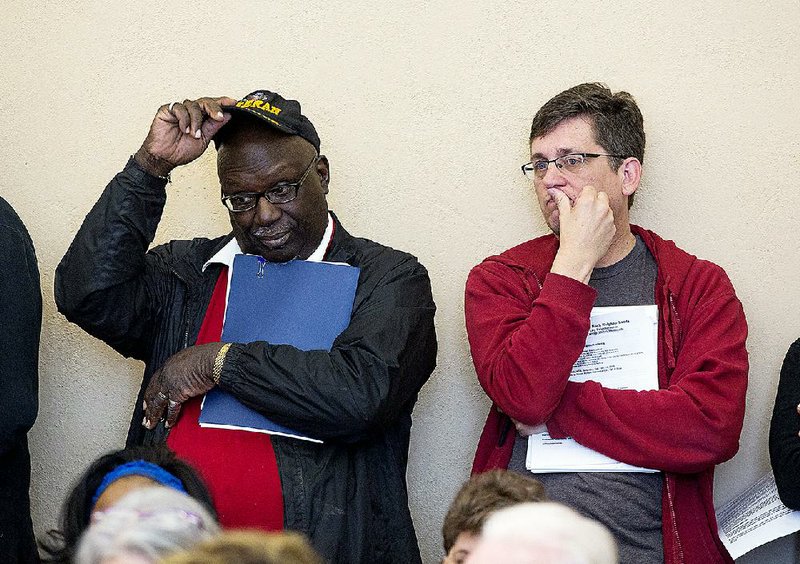Emotions flared at a meeting Saturday morning among neighborhood leaders, Arkansas education leaders and Little Rock residents discussing the takeover of the Little Rock School District -- a loud, heated debate that struggled to stay on track.
The state Board of Education voted 5-4 on Jan. 28 to dissolve the elected School Board and place the district under state control, retaining Superintendent Dexter Suggs on an interim basis.
The takeover resulted from questions on how the School Board was addressing the problems of the six of its 48 schools that are labeled as academically distressed, the improvement of which state officials said Saturday is key to getting the district back under local control.
State officials announced Thursday that the state Education Department did not yet have a plan in place for improving the academically distressed schools to 49.5 percent or better proficiency rates. Those schools are Baseline Elementary, Cloverdale and Henderson middle schools, and J.A. Fair, Hall and McClellan high schools.
The Coalition of Greater Little Rock Neighborhoods invited state Education Commissioner Tony Wood and state Education Board Chairman Sam Ledbetter to answer questions Saturday that were submitted to the coalition and the two men beforehand.
Coalition leaders pared down the questions to a handful that focused on how the state will move forward with the takeover and handle certain school district issues, such as truancy, a $375 million facilities plan adopted by the now-disbanded School Board, and the needs of non-native English speakers and special-needs students.
But many audience members pressed Wood and Ledbetter with questions about whether the state should have taken over the school district to begin with.
Their questions prompted push-back from coalition President Kathy Wells, who repeatedly said such questions were "out of order" and at one point asked a police officer to escort former Little Rock School Board member Jim Ross from the room. The officer said she would not remove Ross from the room because he was exercising his right to free speech.
Later, a second officer arrived to help supervise the meeting.
"I'm glad there's not a lot of students here to see how we act," said the Rev. William Robinson Jr., of Theressa Hoover United Methodist Church.
Robinson added that he wanted to apologize to the students who were at the meeting Saturday for the outbursts of the adults who were "not really respecting each other."
Wood opened the meeting by telling the audience of about 50 people at the Willie L. Hinton Neighborhood Resource Center that he wanted to get the schools back under local control.
"We all have a commonality of where we want to go with our kids," he said.
Audience members questioned Wood's interest and ability to take charge of the schools and said they felt like students had been disregarded.
"We'll get up every day and try to do the best we can," Wood said.
Audience members encouraged Wood and Ledbetter to visit the distressed schools and to explore ways to improve English-language learning so students in the district who study English as a second language can perform on the same level on tests as other districts' English-learners.
Some lamented the disbanding of the School Board, which they felt wanted to improve education for English-learners by implementing a model similar to the one at the Springdale School District.
Wells asked Wood and Ledbetter how the state would address truancy and dropout rates in the district, particularly in light of impending budget cuts related to a loss of desegregation funds.
Wood said the district would be naming the person in charge of the budget Tuesday, prompting Ross to ask who it was.
"Tell us who this businessman is," he said, from the back of the room. Ross has been a frequent critic of the business community's involvement in schools.
Wood said he would not disclose the person's name until Tuesday.
Ross also interrupted Ledbetter, as Ledbetter argued that the Education Board's decision was not personal. Ross said loudly from the back of the room that Education Board members' affiliation with the Walton Family Foundation "scares" him.
It was at that point that Wells asked a police officer to remove Ross from the room, which the officer said she would not do.
Other audience members also questioned the motives of Forward Arkansas, a group formed last year by the state Board of Education, the Winthrop Rockefeller Foundation and the Walton Family Foundation to make recommendations for school improvement in Arkansas.
Former Little Rock School Board member C.E. McAdoo asked Ledbetter how many of the group's 28 members have children currently in public schools. Ledbetter said he didn't know but would ask and get back to McAdoo.
As for the $375 million facilities plan and millage increase approved by the Little Rock School Board last year, Wood said he did not know whether the state would follow the plan or allow an election to take place on the millage increase.
"All of that is under review," he said.
Ledbetter also said he didn't know how the state would implement Little Rock's strategic plan or what models the state would be using, but he said the state has staff members who will look into programs used in other communities that could work in Little Rock.
Several audience members, including J.A. Fair High School science teacher Evelyn James, said the district does not have all the resources it needs to meet the standards set for it already, such as a better literacy program for English-language learners. James said her students are using 10-year-old science books, and they struggle to read them because of low literacy levels.
James said the money for schools needs to be focused on the children and that teachers need to be consulted more frequently.
"We know what we need if, if you'd ask us," she said. "We need to have a voice, and we need to be considered."
Wood and Ledbetter also were asked how the state would help the parents of Little Rock students find jobs, a suggestion that Wood and Ledbetter said was not in the purview of the state Education Department.
"You know, there's a tremendous amount of responsibility that we share," Wood said. "I wish I could make the world a perfect place. No, we are not going to do that."
Saturday's meeting was an informal gathering for community members and state education officials, who Wood said will not be formally meeting during the first year of the takeover, per state rules.
Wells encouraged audience members to email concerns and questions to state officials to continue the conversation until the second year, when formal meetings might occur.
When asked afterward how the meeting went, Wood paused for several seconds before saying the meeting went as he expected and that it offered residents the opportunity to share their thoughts.
When asked if anything said at the meeting changed his perspective, Wood said the comments from community members just reinforced the state's interest and concern in improving schools.
"There's a lot to figure out," he said.
Metro on 02/15/2015

